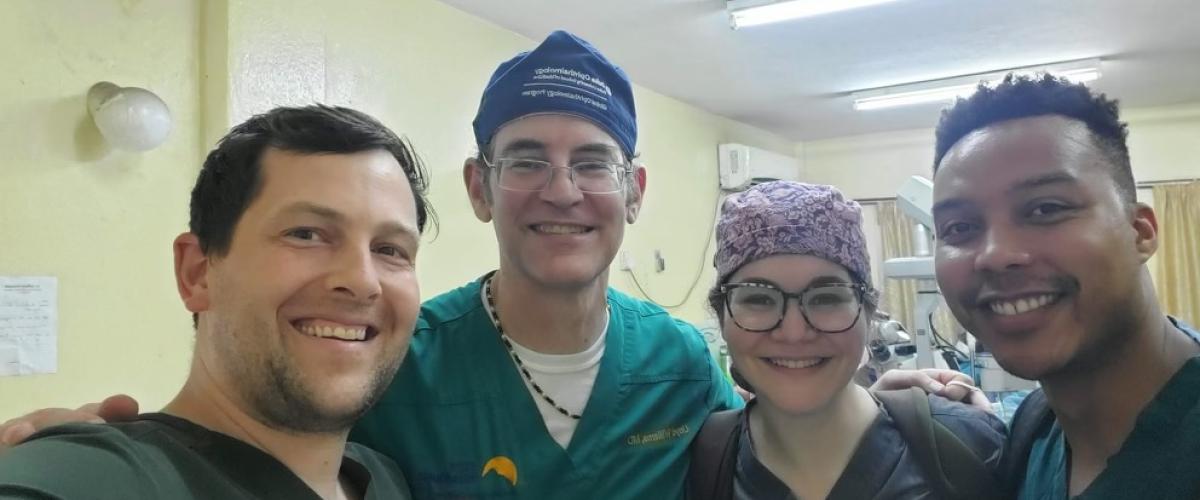
Global ophthalmology is a growing field essential to address blindness and inequities in the global community.
Cataract surgery is considered the only global health intervention as effective as vaccinating children to alleviate human suffering. According to the World Health Organization, half of the world’s 2.2 billion people who suffer vision impairment or blindness could be helped by treatment or surgery.
Duke Global Ophthalmology, led by Lloyd Williams, MD, PhD, was formed to advance research, education, and access to eye care across the globe. In recent years, Duke faculty, staff, and trainees have demonstrated global commitment by caring for patients, training local providers, and performing research in countries such as Ghana, Haiti, Honduras, Liberia, Mongolia, Sierra Leone, Singapore, South Sudan, Thailand, the U.S. Virgin Islands, and across Latin America.
Duke Global Ophthalmology focuses on treating 3 of the top 5 causes of blindness —cataract, refractive error, and corneal opacity—by training surgeons in the diagnosis, prevention, and treatment of all these disorders.
We do not provide immigration sponsorship for the fellowship.
Curriculum
The Global Ophthalmology fellowship is registered with the Association of University Professors of Ophthalmology (AUPO) and will follow the AUPO cornea fellowship compliance program and meets guidelines set forth by the AUPO fellowship compliance committee. There are additional requirements of Duke Global Ophthalmology the fellow will be required to meet. The fellow will learn eye banking, essential in the treatment of corneal disorders, and the variations of treatment needed to perform in an international setting, including low-income nations.
The primary numerical requirements of a cornea fellowship are as follows:
- See approximately 2,000 patients for corneal, refractive, and lens-related conditions. (Dr. Williams’ clinic sees an average of 150 per week, or about 7,500 per year). On international trips, volume of patients can exceed 300 patients per day.
- 100 hours of research and didactic.
- Miracles in Sight training provides roughly 100 hours of training on eye banking and the Duke Corneal Fellowship provides adequate didactic training.
- Fellows will be required to work on and complete a research project internationally.
- 70 corneal transplants (minimum of 15 penetrating keratoplasty, 15 endothelial keratoplasty, and 5 DMEK). Dr. Williams’ Tuesday surgery accounts for about 2 transplants per week (100 total), about 3 IOL exchanges/secondary IOLs per week (150 total), and about 10 cataract surgeries per week (500 total). This is more than enough to meet the minimum requirements, not including the international trips, where sometimes we have done as many as 18 corneal transplants in a single day.
- Refractive surgery requires at least 50 cases observed with 8 primary cases.
Fellowship Applications
We participate in the SFMatch and consider all applications submitted by the deadlines posted on the SFMatch site.
For more information about the Duke Global Ophthalmology fellowship, contact the program coordinator Mary Harris at mary.e.harris@duke.edu
Fellowship for Foreign Nationals
We do not provide immigration sponsorship for Clinical Associates.
Requirements
Full North Carolina medical licensure (not a training license)
Note: we do not accept a training license; international medical school graduates who do not qualify for a North Carolina Medical license cannot be offered fellowship positions. We do not provide immigration sponsorship for clinical associates.
Fellows are expected to submit one or more manuscripts for peer-reviewed publication and prepare at least one application for external support.
The program will develop fellows who will help create developing ophthalmology residency programs abroad and contribute to the academic literature and research capacity of ophthalmology programs and eye banking in developing countries.
It is our hope that trainees will go on to careers not only serving in curing global blindness but will also train others across the globe thus multiplying the number of surgeons.